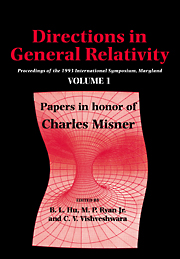 Directions in General Relativity
Directions in General Relativity Published online by Cambridge University Press: 03 February 2010
ABSTRACT
A pedagogical introduction is given to the quantum mechanics of closed systems, most generally the universe as a whole. Quantum mechanics aims at predicting the probabilities of alternative coarse-grained time histories of a closed system. Not every set of alternative coarse-grained histories that can be described may be consistently assigned probabilities because of quantum mechanical interference between individual histories of the set. In “Copenhagen” quantum mechanics, probabilities can be assigned to histories of a subsystem that have been “measured”. In the quantum mechanics of closed systems, containing both observer and observed, probabilities are assigned to those sets of alternative histories for which there is negligible interference between individual histories as a consequence of the system's initial condition and dynamics. Such sets of histories are said to decohere. We define decoherence for closed systems in the simplified case when quantum gravity can be neglected and the initial state is pure. Typical mechanisms of decoherence that are widespread in our universe are illustrated.
Copenhagen quantum mechanics is an approximation to the more general quantum framework of closed subsystems. It is appropriate when there is an approximately isolated subsystem that is a participant in a measurement situation in which (among other things) the decoherence of alternative registrations of the apparatus can be idealized as exact.
Since the quantum mechanics of closed systems does not posit the existence of the quasiclassical domain of everyday experience, the domain of the approximate aplicability of classical physics must be explained.
To save this book to your Kindle, first ensure no-reply@cambridge.org is added to your Approved Personal Document E-mail List under your Personal Document Settings on the Manage Your Content and Devices page of your Amazon account. Then enter the ‘name’ part of your Kindle email address below. Find out more about saving to your Kindle.
Note you can select to save to either the @free.kindle.com or @kindle.com variations. ‘@free.kindle.com’ emails are free but can only be saved to your device when it is connected to wi-fi. ‘@kindle.com’ emails can be delivered even when you are not connected to wi-fi, but note that service fees apply.
Find out more about the Kindle Personal Document Service.
To save content items to your account, please confirm that you agree to abide by our usage policies. If this is the first time you use this feature, you will be asked to authorise Cambridge Core to connect with your account. Find out more about saving content to Dropbox.
To save content items to your account, please confirm that you agree to abide by our usage policies. If this is the first time you use this feature, you will be asked to authorise Cambridge Core to connect with your account. Find out more about saving content to Google Drive.